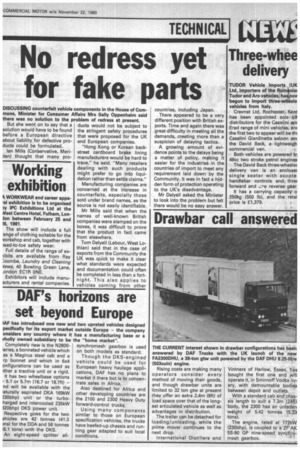No redress yet for fake parts
Page 23

If you've noticed an error in this article please click here to report it so we can fix it.
DISCUSSING counterfeit vehicle components in the House of Commons, Minister for Consumer Affairs Mrs Sally Oppenheim said there was no solution to the problem of redress at present.
But she went on to say that a solution would have to be found before a European directive about liability for defective products could be formulated.
Ian Mills (Conservative, Meriden) thought that many pro ducts would not be subject to the stringent safety procedures that were proposed for the UK and European companies.
"Hong Kong or Korean backstreet cardboard brake lining manufacturers would be hard to trace," he said. "Many retailers dealing with such products might prefer to go into liquidation rather than settle claims."
Manufacturing companies are concerned at the increase in counterfeits, especially those sold under brand names, as the source is not easily identifiable.
Mr Mills said that when the names of well-known British companies were stamped on the boxes, it was difficult to prove that the product in fact came from elsewhere.
Tom Dalyell (Labour, West Lothian) said that in the case of exports from the Community the UK was quick to make it clear what standards were expected and documentation could often be completed in less than a fortnight. This also applies to vehicles coming from other countries, including Japan.
There appeared to be a very different position with British exports. Time and again there was great difficulty in meeting all the demands, creating more than a suspicion of delaying tactics.
A growing amount of evidence points to the delays being a matter of policy, making it easier for the industries in the countries of import to meet any requirement laid down • by the Community. It was in fact a hidden form of protection operating to the UK's disadvantage.
Mr Dalyell asked the Minister to look into the problem but felt there would be no easy answer.














































































































